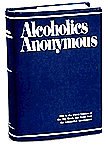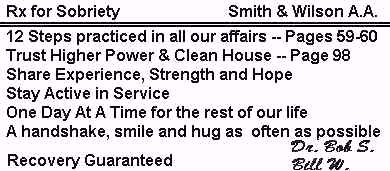

 Click The Images To Go To Page Indicated In The Flag
Step One 1. Admitting you're powerless over your alcoholism-addiction-dysfunction is one of the most powerful actions you can take, even though it doesn't seem that way in the moment. 2. The admission of powerlessness over an alcoholism-addiction-dysfunction is NOT an admission of powerlessness over everything in your life, although sometimes you'll hear people say that. 3. By and large, the unmanageability of your life is because of your alcoholism-addiction-dysfunction.
Step Two 4. Believing that something has more power than you do isn't hard when you look at your alcoholism-addiction-dysfunction. 5. How you define, or even if you don't define, your definition of Higher Power isn't very important in the beginning, and it will change over time. 6. Sanity is much more about balance than it is about anything like mental illness or madness - to be restored to balance makes a lot of sense. Step Three 7. Make a decision. 8. Turning our lives over doesn't mean we give up personal responsibility. In fact, it's a way of taking responsibility. 9. You are responsible for how you understand God... It's truly a personal decision and journey.
Step Four 10. Write your Fourth Step - use pencil or pen and paper, or a computer, but write it down - there's magic in writing. 11. Start with those things that are bothering you the most right now. This list provides many clues about the details your inventory should include. Work from the top down, going backward in time. As we write down something we remember, it will jog into place an earlier happening. 12. Expect to feel some fear writing your inventory... Fearless is about what you write, not what you feel. Total honesty is the key.
Step Five 13. Admitting your wrongs to yourself is about accepting yourself as you are right now, with your flaws and faults. 14. Reading your inventory to someone you trust is really about getting honest with yourself and one other person. It's about not hiding and discovering how human you really are. 15. Choose the person to hear your Fifth Step carefully, but choose someone. Step Six 16. Look deeply inside yourself to discover if you're truly willing to let go... and if you're not, ask for the willingness. 17. Spend some time with this Step; it's often more difficult than it first appears. 18. Acceptance of the defect or shortcoming usually precedes the willingness to let it go.
Step Seven 19. If a defect or problem seems to be sticking, look again at how willing you are to let it go. Try the little prayer over and over again. 20. Humility is also about accepting yourself - all of you, the good, the bad and the in-between. There's usually more in-between than anything else. 21. Humility has nothing to do with humiliation.
Step Eight 22. You made a list of at least some of the people you had harmed when you did your Fourth Step - start with those. 23. "All persons" means just that, everyone you can think of. 24. Keep your list handy so you can add to it when you remember additional people you have harmed.
Step Nine 25. Becoming willing to make amends isn't always easy, but it's always possible. 26. If you're afraid making amends will harm the other person or someone else, talk over you fears with someone you trust - it's really easy to fool yourself in this area. 27. The goal here is to tell the truth, not to be forgiven by the other person. If an old relationship can be set right, so much the better.
Step Ten 28. Step Ten helps us stay honest with ourselves, and helps to keep the "wreckage of the present" down to a "dull roar." Most often I found that it was my attitude that was wrong, it was just my head putting it on me one more time, and therefore an admission of wrong was to myself. 29. Being self-honest includes being aware of the good things we do as well as the bad. 30. An apology at the moment of need is best, but it's better to apologize later than never. "It is easier to eat crow while it is still warm."
Step Eleven 31. It seems our Higher Power, however you define that, is always available - it's up to you to stay in contact. 32. Experiment with your spiritual practices. It's important to discover what works for you. 33. Expect your beliefs and relationship to your Higher Power to change over time.
Step Twelve 34. The spiritual awakening is automatic if you work the Steps. 35. Carrying the message is often subtle and more by example than anything else. 36. Practicing the principles takes lots of practice; it's hard to get worse at something we practice, especially if we do it every day (and all night too), one day at a time.
ABC Page 60 from the Big Book As in so many things, especially with we alcoholics, our History is our Greatest Asset!.. We each arrived at the doors of AA with an intensive and lengthy "History of Things That Do Not Work" .. Today, In AA and In Recovery, Our History has added an intensive and lengthy "History of Things That DO Work!!" and We will not regret the past nor wish to shut the door on it!! Index of AA History Pages on Barefoot's Domain
KEEP COMING BACK!
On the Web May 6, 2002 in the Spirit of Cooperation Three mighty important things, Pardn'r, LOVE And PEACE and SOBRIETY |


